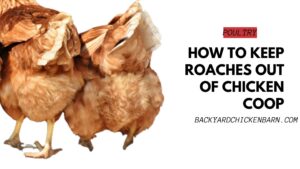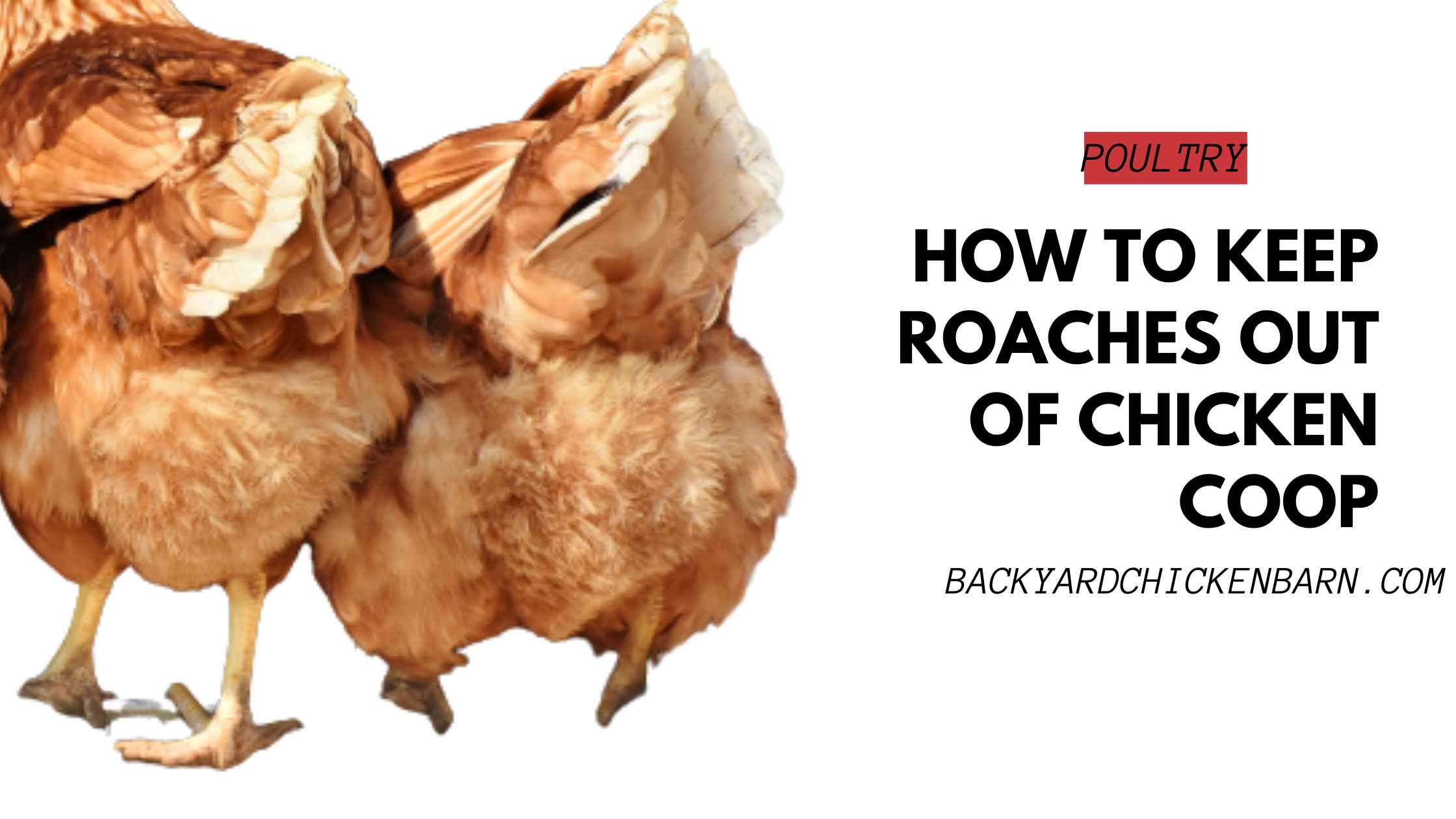How to Keep Roaches out of Chicken Coop
There’s no mistaking that telltale scuttle in the twilight.
It was during one of my evening visits to the coop that I first noticed them: roaches.
As someone deeply invested in providing the best environment for my flock, I knew I had to act.
Over the years, I’ve perfected the art of roach-proofing my coop. And today, I’m sharing my innovative yet tested methods to help fellow poultry enthusiasts conquer this challenge.
1. Tight Seals are Your Best Friend
My first realization? These pests can slip through the tiniest gaps. Using silicone caulk, I meticulously sealed every nook and cranny of the coop.
Windows, doors, and even tiny crevices weren’t spared.
2. Embrace the Power of Herbs
Surprisingly, roaches detest the aroma of specific herbs. I began planting bay leaves, catnip, and mint around the coop’s perimeter.
Not only did it add an aesthetic touch, but it acted as a natural repellent.
3. Get Elevated
Roaches are opportunists. I elevated feeders and waterers off the ground, making it harder for them to access the food.
This simple change made a significant difference.
4. Nightly Clean-Up Rituals
Every evening, I made it a habit to clear out any leftover feed. Roaches are nocturnal, and depriving them of a nightly feast is a step in the right direction.
5. The Magic of Diatomaceous Earth
I’d heard of food-grade diatomaceous earth for deterring mites, but its efficacy against roaches was a revelation. Sprinkling it around the coop and in common roach pathways was a game-changer.
The microscopic shards in the powder pierce the roaches’ exoskeletons, leading to dehydration.
6. Lights Out!
Roaches love dark, damp places. I introduced solar-powered coop lights.
Not only did this discourage roaches, but it also promoted egg-laying during shorter winter days. An unexpected win-win!
7. Ventilation is Vital
A well-ventilated coop reduces the dampness roaches adore. Ensuring my coop had sufficient airflow prevented the buildup of moisture, making the environment less appealing to them.
8. Barriers and Borders
I experimented with creating borders using cedar chips around the coop.
Roaches dislike cedar. This aromatic woodchip barrier not only deterred them but also added a pleasant scent to the coop surroundings.
9. Natural Predators
Did you know that chickens love to snack on roaches? While I didn’t want an infestation, occasionally letting my flock hunt down a few became a natural and nutritious treat for them.
10. Consistent Monitoring
Lastly, my secret weapon: vigilance. Regular inspections, especially at dusk, helped me spot any signs of roaches early on, allowing me to take swift action.
In this ongoing battle against roaches, being proactive is key. Through a combination of natural deterrents, coop modifications, and keen observations, I’ve managed to keep my coop roach-free.
Remember, a clean and roach-free coop isn’t just about aesthetics; it’s about ensuring the health and happiness of our feathered friends. Happy roach hunting!
ALSO SEE: How to Clean a Chicken Coop with a Dirt Floor

FAQs on Keeping Roaches Out of Your Chicken Coop
1. Why is sealing the coop important for roach prevention? Roaches can enter through tiny gaps; sealing these prevents their access.
2. Which herbs repel roaches naturally? Bay leaves, catnip, and mint are effective roach repellents.
3. How does elevating feeders and waterers deter roaches? By raising these items, it becomes harder for roaches to access food.
4. What is the significance of a nightly clean-up? Roaches are nocturnal. Removing leftover feed deprives them of their night-time meal.
5. How does food-grade diatomaceous earth work against roaches? Its microscopic shards pierce roaches’ exoskeletons, leading to their dehydration.
6. How do solar-powered coop lights deter roaches? Roaches prefer darkness. Introducing light makes the coop less appealing to them.
7. Why is good ventilation crucial in a coop? Roaches are attracted to damp places. Proper ventilation reduces dampness.
8. Can cedar chips help in roach prevention? Yes, roaches dislike cedar. Creating barriers with cedar chips can deter them.
9. Do chickens naturally prey on roaches? Yes, chickens enjoy snacking on roaches, making them natural predators.
10. How often should I inspect the coop for roaches? Regular inspections, especially at dusk, will help spot early signs of roaches.
11. Are there other aromatic barriers I can use besides cedar chips? Cedar chips are particularly mentioned, but other aromatic woods may also be effective.
12. Does sealing the coop restrict its ventilation? No, while sealing gaps is important, ensure that the coop still maintains good ventilation.
13. How do I apply diatomaceous earth in my coop? Sprinkle it around the coop and common roach pathways for best results.
14. Are there any side effects to chickens consuming roaches? Occasional consumption is a natural treat, but you wouldn’t want an infestation as it indicates unsanitary conditions.
15. Can roaches harm my chickens? While chickens can eat roaches, an infestation might indicate a more unsanitary environment, potentially harmful to chickens.
16. How do bay leaves deter roaches? Roaches detest the aroma of bay leaves, making them a natural repellent.
17. Do roaches have any beneficial aspects in a coop setting? In small numbers, they can be a natural treat for chickens, but you don’t want an infestation.
18. Is there a specific type of caulk recommended for sealing coop gaps? Silicone caulk is effective for sealing coop gaps.
19. Can roaches become resistant to any of these deterrent methods? Using a combination of methods reduces the chance of roaches developing resistance.
20. How does light promote egg-laying in winter? Chickens lay more eggs when they receive more light. Solar-powered coop lights can extend their perceived daylight hours.
21. Are there commercial roach repellents safe for coops? Always opt for natural or organic repellents. Many commercial ones may contain chemicals harmful to chickens.
22. How long does the scent of cedar chips last as a repellent? Over time, the scent may diminish. Refresh the cedar chips periodically for optimal results.
23. Are there specific types of roaches more common in chicken coops? Roach species can vary based on region, but the common ones around households and outdoor structures might be attracted to coops.
24. Do roaches pose any diseases or health concerns for chickens? A roach infestation might carry diseases or indicate unsanitary conditions which could be harmful.
25. How often should I replace the herbs around the coop? Replace them when they begin to wither or if their aroma diminishes.
26. Can diatomaceous earth harm my chickens? Always use food-grade diatomaceous earth. It’s safe for chickens and effective against pests.
27. Are there specific spots in the coop where roaches commonly hide? Roaches prefer dark, damp places, so check corners, crevices, and underneath feeders.
28. How do I ensure proper ventilation without inviting pests? Install vents or mesh windows high up where pests can’t easily access.
29. Can I mix diatomaceous earth with chicken feed? Yes, it’s safe in small amounts and can help deter internal parasites.
30. Does the coop’s location impact roach infestations? Yes, placing a coop away from compost piles or dense vegetation can reduce roach attraction.
31. How do I handle a severe roach infestation? Intensify the methods mentioned and consider consulting with a pest control expert familiar with poultry.
32. Can I use essential oils as roach repellents? Certain essential oils like peppermint can repel roaches, but ensure they’re safe for chickens before use.
33. Are there any plants that attract roaches, which I should avoid? Avoid plants that retain a lot of moisture close to the coop, as damp environments can attract roaches.
34. Will a well-lit coop disturb the chickens’ sleep? Place solar lights strategically so they deter pests without disturbing the chickens’ rest.
35. Can I use other types of aromatic wood chips besides cedar? Cedar is especially mentioned for its repellent properties, but experimenting with other aromatic woods may yield positive results.
36. What should I do if the roaches return after implementing these measures? Reevaluate each step, reinforce barriers, and consider introducing additional deterrents.
37. Can I use sticky traps for roaches in the coop? While effective, ensure they’re placed where chickens can’t access them to avoid accidents.
38. How can I discourage roaches without harming beneficial insects? Using natural repellents like herbs and diatomaceous earth is selective against pests.
39. Will these methods also deter other pests? Many of these methods, especially herbs and diatomaceous earth, can deter a variety of pests.
40. Can I introduce predatory insects to handle roaches? While certain insects like nematodes can help, ensure they don’t introduce other problems or harm chickens.



